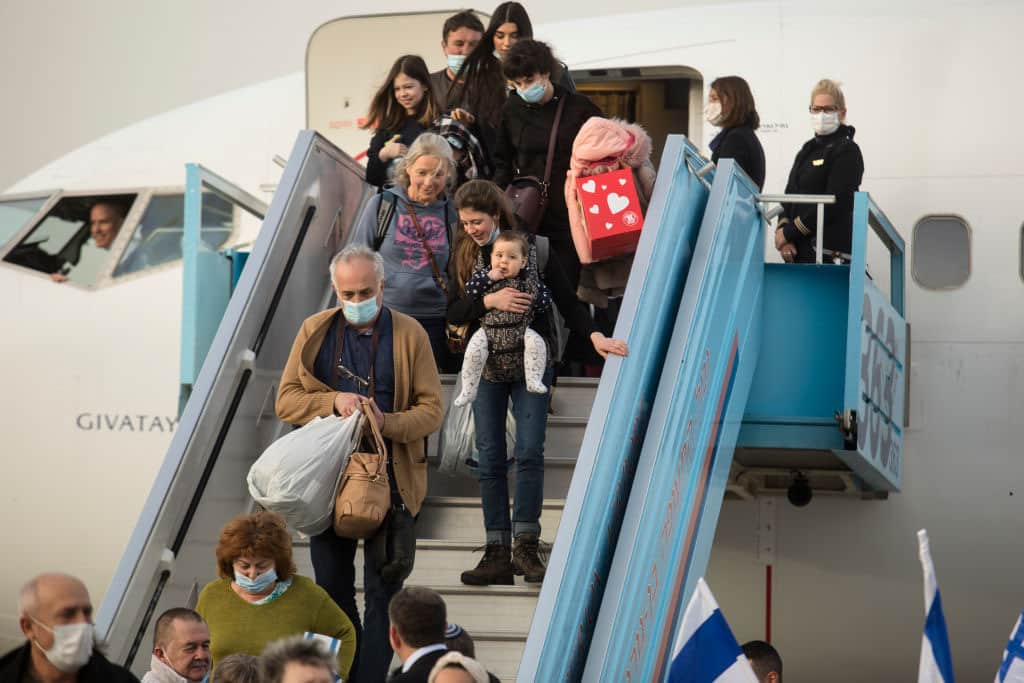 Jewish Ukranians disembark from an aircaft after fleeing Russian invasion on March 6, 2022 in Tel Aviv, Israel. (Photo by Amir Levy/Getty Images)
Jewish Ukranians disembark from an aircaft after fleeing Russian invasion on March 6, 2022 in Tel Aviv, Israel. (Photo by Amir Levy/Getty Images) To read more articles from The Media Line, click here.
After the Wagner Group led by the rumored-to-be-Jewish Yevgeny Prigozhin took over Russian military installations and threatened to drive 700 miles north and launch a coup in Moscow, many feared that Russia’s Jews would become scapegoats.
The incident infused a new sense of uncertainty into the country, already reeling from international sanctions linked to its war on Ukraine.
But will the aborted uprising spur a further exodus of Russia’s Jews?
Russia’s invasion of Ukraine in February 2022 triggered a wave of Jewish emigration from both countries, many of whom moved to Israel. Over 43,000 Jews from Russia and over 15,000 from Ukraine moved to Israel in 2022, accounting for almost 80% of Israel’s total immigration that year.
In the past 17 months, 64,633 Russians have moved to Israel, according to the quasi-governmental Jewish Agency.
If the trend continues, over half of Russia’s Jewish population will be gone in seven years, according to a report published by the London-based Institute for Jewish Policy Research last week. The institute estimates that some 145,000 Jews and an equal number of part-Jews who have at least one Jewish parent live in Russia.

However, some Russians working with Jewish organizations say it is too early to tell whether the wave of Jewish emigration will continue.
Tanya Lvova, deputy director of the Eva Jewish Welfare and Community Center in St. Petersburg, said that most of her center’s 2,000 Jewish beneficiaries are elderly and uninterested in leaving.
She said that the war in Ukraine has not, to date, triggered threats against the Jewish community.
“We were worried a year ago that [threats against Russian Jews] might happen, but they didn’t,” Lvova told The Media Line. “I don’t see a rise in antisemitism in my surroundings. The [Russian] state does not support antisemitism, and we hope it stays that way.”
In fact, Lvova said, “Russia has been one of the least antisemitic countries in the last decade.” She said that although anti-Jewish sentiment has grown in the US and France, it is “not fashionable” in Russia.
Nevertheless, Lvova said that almost half of the participants in her organization’s family camps have recently migrated. These participants were particularly active in the Jewish community and had “always been interested” in moving to Israel, she said.
Howard Flower, director of Jewish immigration to Israel for the International Christian Embassy in Jerusalem, said the number of newcomers from all parts of the former Soviet Union might increase this year.
Jewish immigration to Israel from Russia and the former Soviet republics is “quite high now due to uncertainty,” Flower told The Media Line.
Flower recalled his first visit to St. Petersburg in 1992, when Russian Jewish emigration to Israel spiked following the Soviet collapse.
He said the numbers today are similar and “we will know better by the end of the year” whether that trend continues.
The author of the report for the Institute for Jewish Policy Research, demographer Daniel Staetsky, called 2022 “a watershed year” for Russian and Ukrainian Jews.
“If migration from these countries continues for seven years at the levels seen in 2022 and early 2023, 80% to 90% of the 2021 Jewish population of Ukraine and 50% to 60% of the 2021 Jewish population of Russia will have emigrated,” he said.
Staetsky warned that mass Jewish migration could signal “a wider storm.”
In the past, the widespread relocation of European Jews followed major political events, such as the rise of the Nazi regime in Germany in the 1930s or the collapse of the Soviet Union in the late 1980s-early 1990s.
In mid-2023, the scale of Jewish migration from Russia and Ukraine offers “ominous signs of a major, possibly catastrophic, political crisis in Europe,” Staetsky wrote.
Flower said that while the Wagner Group incident “captured the world’s attention,” it is unclear whether the brief uprising has rattled Russia’s Jews sufficiently to make them move.
In 1993, then-President Boris Yeltsin sought to suppress rebels in Moscow by calling out the tanks. Pro-coup fighters briefly seized the Russian parliament and TV station. It was “dramatic but ended quickly,” Flower said.






















 More news and opinions than at a Shabbat dinner, right in your inbox.
More news and opinions than at a Shabbat dinner, right in your inbox.